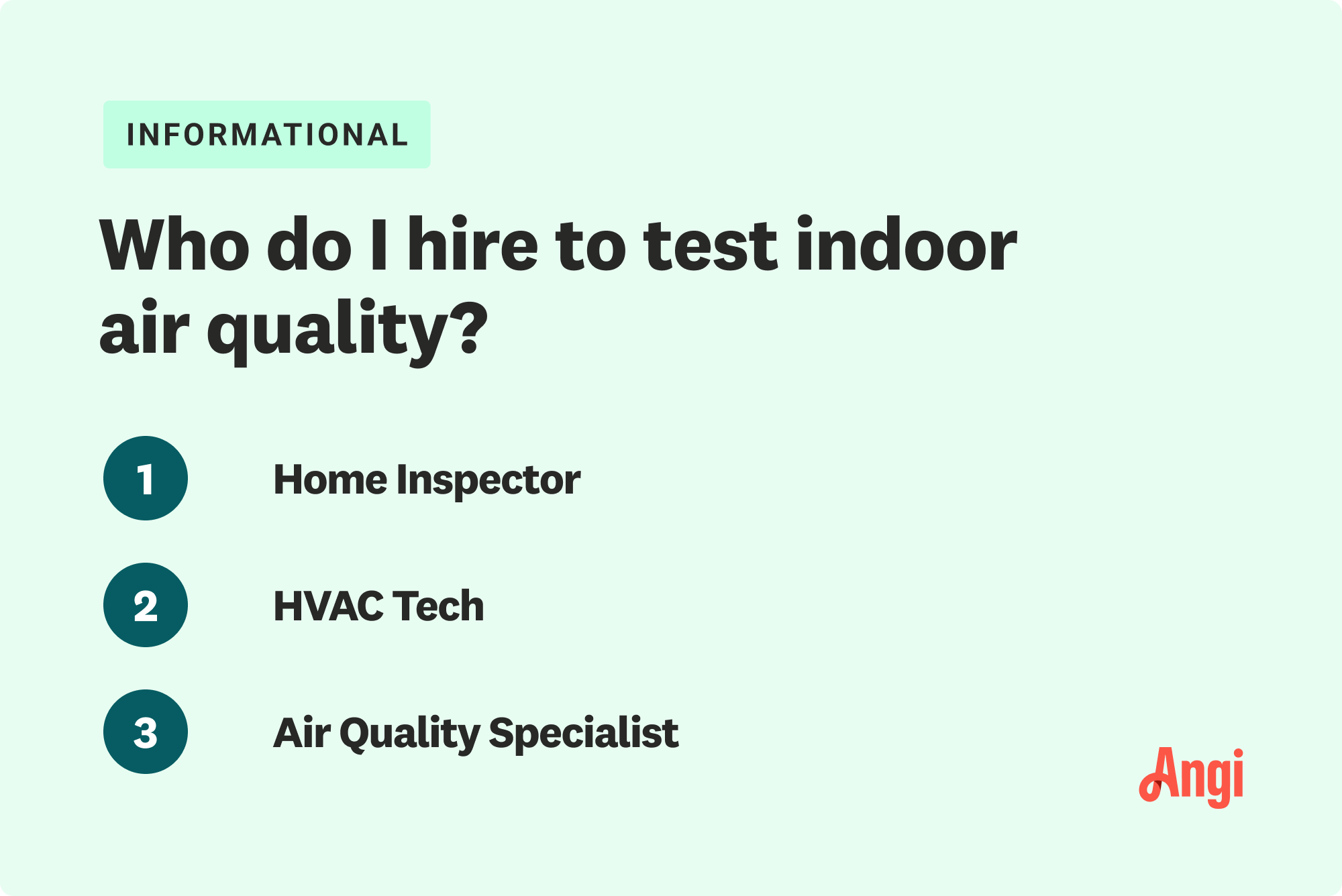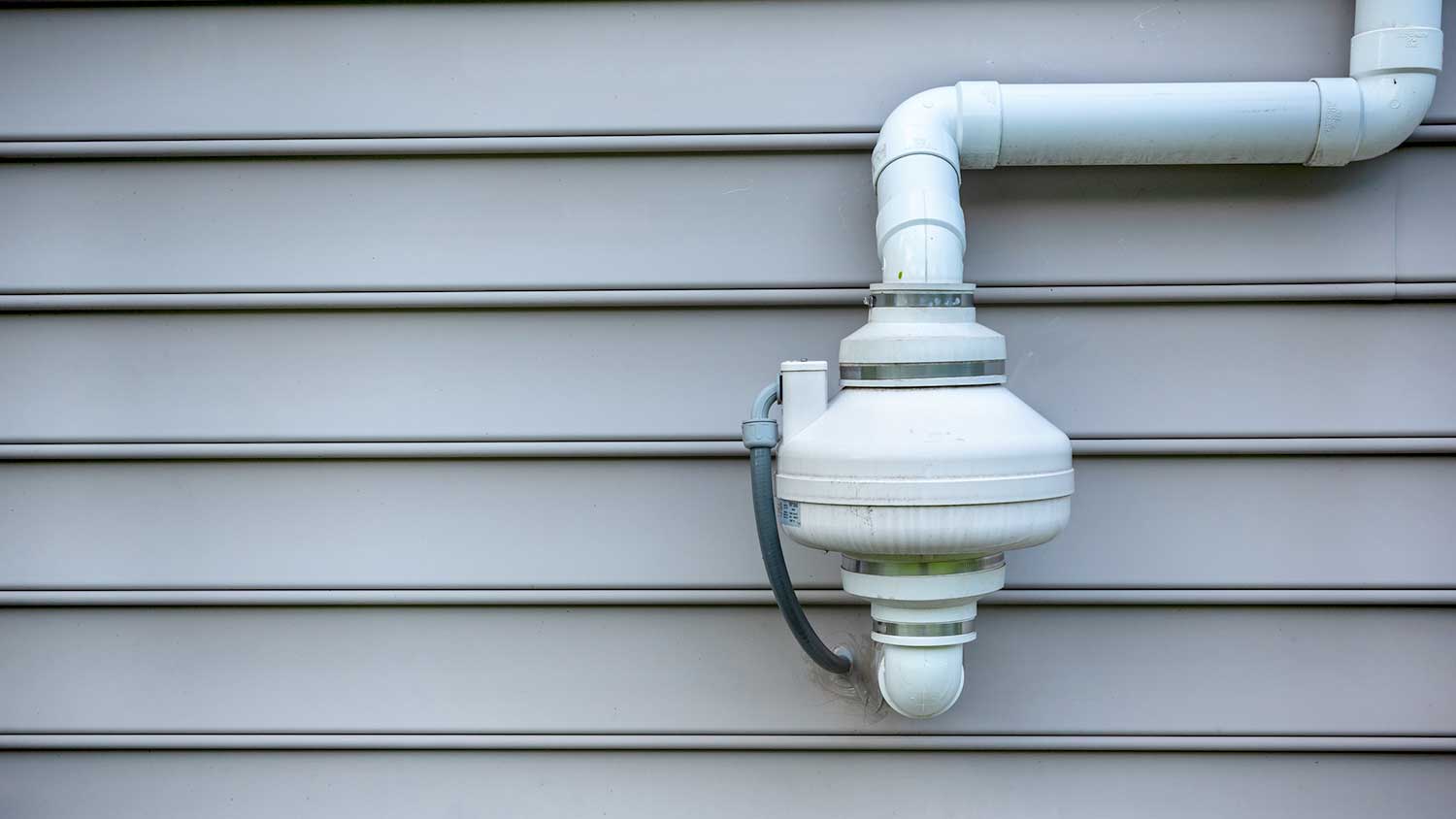
Find out what impacts radon testing costs, including average prices for DIY kits and professional services, so you can protect your home and budget confidently.
Indoor air quality testing costs average $437, with an average range from $292 to $584 depending on home size, test type, and frequency of testing


Indoor air quality testing costs vary depending on the type of test, size of your home, and the number of contaminants screened.
Air quality tests identify hidden pollutants and allergens that may affect your family’s health.
Investing in air quality testing can boost long-term health and even increase your home’s value.
Ranging from $75 to $150 per hour, professional testing delivers more reliable results than DIY kits, helping you target problems more effectively.
Add-ons such as mold or radon testing can increase your total, and some providers charge per square foot or per sample.
This article was created using automation technology and thoroughly fact-checked and edited by an Angi Editor in accordance with our AI policy.
Indoor air quality testing cost averages $437, with most homeowners spending between $292 to $584 on average for a standard assessment. This service's price depends on the type of test, your home’s size, and whether you choose a DIY kit or hire a professional. Some companies charge per sample or square foot, while others offer flat-rate packages.

Several factors shape what you’ll pay for indoor air quality testing. Let’s break down the biggest influences, so you know what to expect before you schedule your assessment.
The type of test you choose is a major driver for indoor air quality testing cost. Common options include mold, radon, volatile organic compounds (VOCs), allergens, asbestos, carbon monoxide, formaldehyde, and dust particulate testing. Each targets specific hazards with unique sampling and lab analysis methods. Choosing the right mix depends on your concerns, home age, and location.
Some homes require multiple tests, especially if you have health concerns or suspect several contaminants. Bundled pricing is common, which can lower the per-test cost when you order several assessments at once.
| Test Type | Description | Average Cost |
|---|---|---|
| Mold | Checks for airborne or surface mold spores | $300–$1,000 |
| Radon | Detects radioactive gas, a known carcinogen | $150–$800 |
| VOCs | Measures volatile organic compounds from products/furnishings | $200–$400 |
| Allergens | Screens for dust mites, pollen, pet dander | $100–$300 |
| Asbestos | Identifies asbestos fibers in air or materials | $250–$800 |
| Carbon monoxide | Detects dangerous gas from fuel-burning appliances | $100–$200 |
The size of your home directly affects indoor air quality testing cost. Larger spaces require more samples, additional time, and sometimes specialized equipment.
Testing companies may charge by square foot, by room, or offer a flat rate for homes within a standard size range. Apartments and condos often cost less than single-family homes or large properties. Very large properties, homes with multiple HVAC systems, or those with hard-to-access areas may see higher costs.
| Size | Square Feet | Average Cost |
|---|---|---|
| Apartment/condo | Up to 1,000 | $200–$300 |
| Small home | 1,000–2,000 | $300–$500 |
| Medium home | 2,000–3,000 | $500–$1,000 |
| Large home | 3,000+ | $1,000–$3,000 |
How often you test your indoor air quality impacts your overall cost. Most homeowners test once, but annual or seasonal testing is recommended if you have ongoing concerns, health symptoms, or recent renovations.
One-time testing is the most common choice, but some companies offer discounts for regular schedules or bundled packages. Ongoing monitoring services may include annual or semi-annual visits at a reduced rate per test. Frequent testing can help you catch problems early, potentially saving money on future remediation.
Materials and equipment used in testing also play a role in your total indoor air quality testing cost. Common tools include air sampling pumps, canisters, petri dishes, and specialized test kits. Professional-grade kits and lab analysis deliver higher accuracy but increase the price.
Basic DIY kits are less expensive but may only test for one or two contaminants. More advanced or comprehensive kits, and those requiring lab work, cost more but provide detailed results. Investing in better materials can mean more reliable results, especially if you have health concerns.
| Test Kit Type | Description | Average Cost |
|---|---|---|
| Basic DIY kit | Tests for a single contaminant, no lab fee | $15–$50 |
| Multi-test DIY kit | Covers several contaminants, some lab work included | $50–$150 |
| Pro-grade kit | Requires lab analysis, higher accuracy | $100–$300 |
| Air sampling pump | Used by pros for advanced sampling | $200–$500 |
Labor is a significant portion of indoor air quality testing cost when hiring a professional. Certified inspectors, environmental consultants, and HVAC specialists all offer testing, charging hourly rates, flat fees, or minimum service charges.
Hiring an indoor air quality pro ranges from $75 to $150 per hour, with many companies offering flat rates for standard tests. Regional price differences exist, especially in high-demand urban areas.
Professional labor includes a site visit, sample collection, lab analysis, and a detailed report with recommendations.
Where you live can impact your indoor air quality testing cost. Urban areas tend to have higher labor rates, while rural regions may see added travel fees. State-by-state differences arise from local regulations or climate factors that affect demand.
Testing specific areas of your home, such as basements, attics, or crawl spaces, may cost more due to limited access or extra sampling needs. Homes in high-humidity or flood-prone zones may require additional mold or moisture testing.
Tipping for indoor air quality testing professionals is not required, but it is appreciated if you feel your inspector went above and beyond. If you choose to tip, $10 to $20 per technician is reasonable. For larger jobs or exceptional service, consider tipping a bit more. Always check with the company, as some have policies against accepting tips.
Testing your home’s air quality at the right intervals helps protect your health and can prevent costly issues. Most experts recommend annual testing, especially if you have children, elderly residents, or anyone with respiratory conditions.
After major renovations, water damage, or when moving into a new home, it’s wise to conduct a full assessment. Seasonal factors, like increased pollen in spring or high humidity in summer, may also prompt additional testing. Homes with pets, smokers, or nearby construction benefit from more frequent checks. Regular testing helps you catch issues early and avoid bigger remediation bills down the line.
Certain situations call for add-on tests, which will increase your total indoor air quality testing cost. These specialized services target specific hazards or provide post-remediation assurance.
Common add-ons include:
Mold inspection: $250 to $500
Radon testing: $125 to $220
Asbestos sampling: $300 to $800
Lead paint testing: $130 to $1,500
Follow-up or post-remediation testing: $100 to $300
Add-ons are recommended when you have a known risk, health symptoms, or after remediation work. Some companies offer bundled rates when combining several tests in one visit.
You have a choice between DIY test kits and hiring a professional—each with its own cost, benefits, and limitations. DIY kits are affordable and convenient but may not provide the same accuracy or scope as a professional service.
DIY kits often test for one or two contaminants, with prices ranging from $15 to $200. Many require you to send samples to a lab for analysis, which may incur extra fees. Professional testing, while more expensive, covers a broader range of pollutants and includes expert interpretation of results.
DIY testing requires careful sample collection, some basic tools, and time to interpret results. Risks include inaccurate findings or missing hidden contaminants, especially if you’re not experienced. For comprehensive or legally required testing, it’s best to hire a certified pro.
Improve your indoor air quality and streamline your budget with these cost-saving tips for indoor air quality tests:
Compare prices: Compare quotes from several certified professionals to get the best value.
Inquire about discounts: Use coupons or promotions from local providers, and ask about bundling multiple tests for a discount.
Book during off-season: Schedule testing during off-peak times for better labor rates.
Prep your space: Prepare your home in advance to reduce labor time.
Choose tests strategically:Only test for specific contaminants if you have a known concern.
Home is the most important place on earth, which is why Angi has helped more than 150 million homeowners transform their houses into homes they adore. To help homeowners with their next project, Angi provides readers with the most accurate cost data and upholds strict editorial standards. We’ve surveyed thousands of real Angi customers about their project costs to develop the pricing data you see, so you can make the best decisions for you and your home. We pair this data with research from reputable sources, including the U.S. Bureau of Labor Statistics, academic journals, market studies, and interviews with industry experts—all to ensure our prices reflect real-world projects.
Want to help us improve our cost data? Send us a recent project quote to [email protected]. Quotes and personal information will not be shared publicly.
From average costs to expert advice, get all the answers you need to get your job done.

Find out what impacts radon testing costs, including average prices for DIY kits and professional services, so you can protect your home and budget confidently.

Get clear answers on how much radon remediation costs, including average prices, key cost factors, and tips to save money on your home’s radon mitigation.

Want to learn how to master DIY radon mitigation? We have a step-by-step guide on how to complete this challenging project on your own.

How long does a radon fan last? Depending on the quality of the fan, usage, and maintenance, a radon fan can last five to ten years.

You need to protect your home from radon, but what does a radon mitigation system look like? Check out this radon mitigation system diagram to learn how it works.

How long does a radon mitigation system last? A properly installed and maintained system can last 20 years or more, but various issues can reduce the life span.